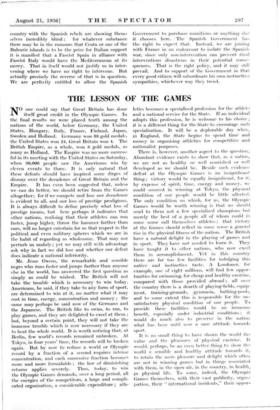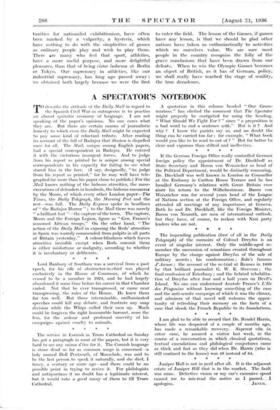THE LESSON OF THE GAMES N O one could say that
Great Britain has done itself great credit in the Olympic Games. In the final results we were placed tenth among the nations of the world, below Germany, the United States, Hungary, Italy, France, Finland, Japan, Sweden and Holland. Germany won 33 gold medal!, the United States won 24, Great Britain won 4. The British Empire, as a whole, won 6 gold medals, as many as Holland. The Empire was no more success- ful in its meeting with the United States on Saturday, when 90,000 people saw the Americans win by eleven events to three. It is only natural that these defeats should have inspired some dirges of dismay over the decadence of Great. Britain and the Empire. It has even been suggested that, unless we can do better, we should retire from the Games altogether; for if we compete and lose our decadence is evident to all, and our loss of prestige prodigious. It is always difficult to define precisely what loss of prestige means, but here perhaps it indicates that other nations, realising that their athletes can run faster, jump higher, throw the hammer farther than ours, will no longer entertain for us that respect in the political, and even military spheres which we are in the habit of regarding as wholesome. That may not perturb us unduly; yet we may still with advantage ask why in fact we did lose and whether our defeat does indicate a national inferiority.
Mr. Jesse Owens, the remarkable and sensible negro who runs faster and jumps farther than anyone else in the world, has answered the first question as simply as could be wished. The British will not take the trouble which is necessary to win today. Americans, he said, if they take to any form of sport, are determined to win at it, no matter what it may cost in time, energy, concentration and money ; the same may perhaps be said now of the Germans and the Japanese. The British like to swim, to run, to play games, and they are delighted to excel at them ; but, beyond a certain point, they will not take the immense trouble which is now necessary if they arc to beat the whole world. It is worth noticing that, at Berlin, few world's records remained unbroken. At Tokyo, in-four years' time, the records will be broken again. • But by now to reduce a world or Olympic record by a fraction of a second requires intense concentration, and each successive fraction becomes more and more formidable ; the law of diminishing returns applies severely. Thus, today, to win the Olympic Games demands, over a long period, all the energies of the competitors, a large and compli- cated organisation, a considerable expenditure ; ath- letics becomes a specialised profession for the athlete and a national service for the State. If an individual adopts this profession, he is welcome to his choice ; it is a different thing for the State to encourage such specialisation. It will be a deplorable day when, in England, the State begins to spend time and money in organising athletics for competitive and nationalist purposes.
There is, however, another aspect to the question. Abundant evidence exists to show that, as a nation, we are not as healthy or well nourished or well developed as we should be. Beside such evidence defeat at the Olympic Games is an insignificant thing ; victory would be equally insignificant, for if, by expense of spirit, time, energy and money, we could succeed in winning at Tokyo, the physical condition of our people would be little affected. The only condition on which, for us, the Olympic Games would be worth winning is that we should send to them not a few specialised champions but merely the best of a people all of whom could in some sense call themselves athletes ; that victory at the Games should reflect in some sense a general rise in the physical fitness of the nation. The British have a natural delight in the playing of games and in sport. They have not needed to learn it. They have taught it to other nations, who now excel them in accomplishment. Yet in - this country there are far too few facilities for indulging this native and instinctive taste. A Londoner, for example, one of eight millions, will find few oppor- tunities for swimming, for cheap and healthy exercise, compared with those provided abroad ; all over the country there is a dearth of playing-fields, equip- ment, training-grounds, gymnasia, bathing-pools, and to some extent this is responsible for the un- satisfactory physical condition of our people. To provide these facilities would be an immense benefit, especially under industrial conditions ; it would do much also to preserve in the nation what has been until now a sane attitude towards sport.
It is no small thing to have shown the world the value and the pleasures of physical exercise. It would, perhaps, be an even better thing to show the world a sensible and healthy attitude towards it, to retain the mere pleasure and delight which often. are not in winning games but in things associated with them, in the open. air, in the country, in health, in, physical life. To some, indeed, the Olympic Games themselves, with their vast publicity, organ- isation, their " international incidents," their oppor- tunities for nationalist exhibitionism, have often been marked by a vulgarity,_ a hysteria, . which have nothing to do with the simplicities of games as ordinary people play and wish to play them.. There are many who feel that sport, athletics, have a more useful purpose, and more delightful pleasures, than that of being victor ludorum at Berlin or Tokyo. Our supremacy in athletics, like our industrial supremacy, has long ago passed away ; we obtained both largely because we were the first to enter the field. The lesson of the Games, if games have any lesson, _ is that we should be glad other nations have taken so enthusiastically to activities which we ourselves value. We are sure most people in the country recognise the folly of the grave conclusions that have been drawn from our defeats. When to win the Olympic Games becomes an object of British, as it has of German, policy, we shall really have reached the stage of senility, the true decadence.







































 Previous page
Previous page